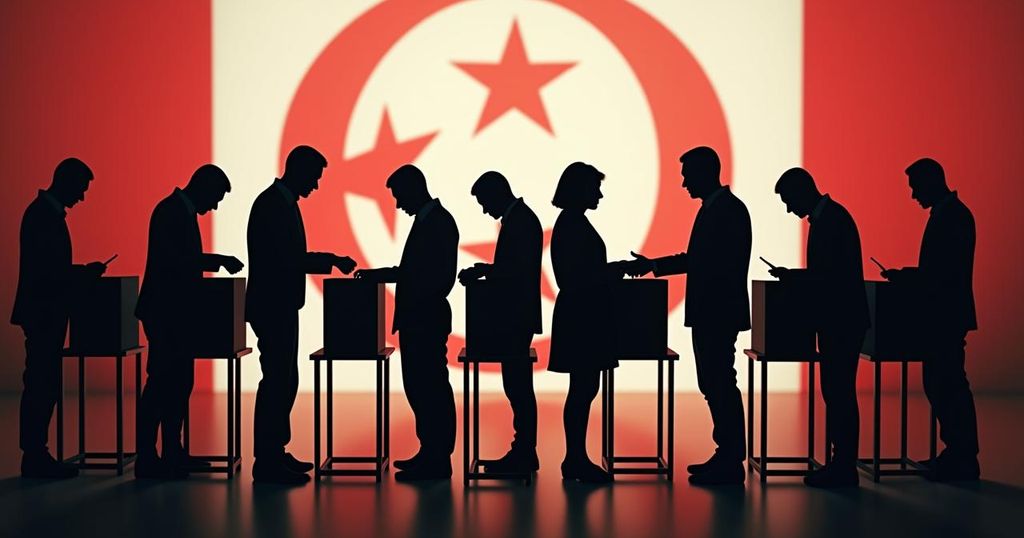Tunisians Vote Amidst Controversial Presidential Election

Tunisians voted in a presidential election on Sunday with President Kais Saied facing minimal opposition due to many of his major challengers being imprisoned or excluded from the ballot. This election, amidst a backdrop of political repression and economic difficulties, raises questions about the state of democracy in Tunisia and Saied’s leadership amidst growing public discontent and the opposition’s calls for a boycott of the process.
Tunisians participated in a presidential election on Sunday, where President Kais Saied encountered minimal opposition, as many of his primary challengers were imprisoned or excluded from the ballot. Saied, who initially won against an anti-establishment wave five years earlier, appears set to secure re-election amid widespread skepticism regarding the possibility of a meaningful change in leadership. This election marks the third since the unrest that resulted in the removal of long-standing President Zine El Abidine Ben Ali in 2011, a pivotal event in the Arab Spring that led Tunisia to be viewed as a beacon of democracy. The Tunisian narrative has, however, become increasingly complex, marred by economic struggles, political strife, and security challenges that continue to plague the nation. The current political landscape reflects a consolidation of power under Saied, who enacted significant changes in July 2021, including the dissolution of the parliament and the introduction of a new constitution designed to centralize his authority—actions which many critics have labeled a coup. Despite substantial public dissent, a low-turnout referendum subsequently endorsed Saied’s constitutional changes. The presidential race has seen limited participation, with only three candidates approved to run: Saied, Zouhair Maghzaoui, and Ayachi Zammel. Both involved candidates carry controversial narratives, as Maghzaoui has been criticized for past support of Saied’s constitutional reforms and Zammel faces legal challenges related to campaign irregularities. Prominent opposition figures, notably Rached Ghannouchi of the Ennahda Party, remain incarcerated, effectively neutralizing significant challenges to Saied. Opposition groups largely boycott the elections, condemning them as illegitimate. The economic landscape remains dire: unemployment rates have surged, reaching 16%, and Tunisia’s reliance on international aid exacerbates its political instability. The situation is further complicated by increased migration attempts and anti-immigrant rhetoric by Saied’s administration, casting a shadow on human rights conditions. While Tunisia maintains its relationships with Western partners, there are indications of an increasing pivot towards non-Western alliances, exemplified by agreements with Iran and financial partnerships with China. The upcoming elections serve not only as a reflection of public sentiment towards Kais Saied’s tenure but also highlight the broader implications for Tunisia’s democracy and regional geopolitical dynamics.
The country of Tunisia, once heralded as a success story within the Arab Spring movement, has experienced significant political and economic challenges since the uprising that unseated its long-term autocrat in 2011. Following several years of perceived democratic progress, the political landscape has undergone a transformation under President Kais Saied, characterized by a consolidation of power and the marginalization of opposition voices. The repercussions of these changes have led to public dissatisfaction, with many questioning the legitimacy of the electoral process and Saied’s governance amidst ongoing economic turmoil and a decrease in public engagements in political processes. As Tunisia’s presidential election unfolds, it will provide insight into the state of democracy in the country and the potential direction of future governance.
In conclusion, the presidential election in Tunisia, characterized by a lack of viable opposition and widespread public cynicism, presents a critical juncture for the nation’s democracy. President Kais Saied’s approach to governance, marked by consolidating power and political suppression, poses serious questions about Tunisia’s democratic future amidst economic unrest and social challenges. The election’s outcome will be pivotal not only for the political landscape of Tunisia but also for its relationships with both regional and global partners, reflecting broader trends of governance and accountability in the region.
Original Source: www.euronews.com







